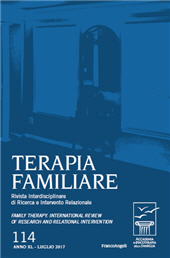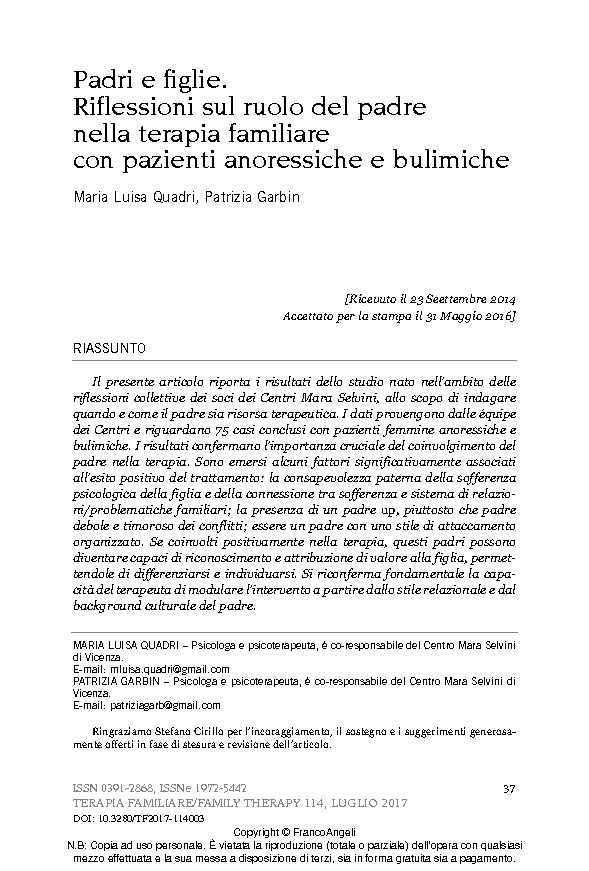Padri e figlie : riflessioni sul ruolo del padre nella terapia familiare con pazienti anoressiche e bulimiche
37-60 p.
Il presente articolo riporta i risultati dello studio nato nell'ambito delle riflessioni collettive dei soci dei Centri Mara Selvini, allo scopo di indagare quando e come il padre sia risorsa terapeutica. I dati provengono dalle équipe dei Centri e riguardano 75 casi conclusi con pazienti femmine anoressiche e bulimiche. I risultati confermano l'importanza cruciale del coinvolgimento del padre nella terapia. Sono emersi alcuni fattori significativamente associati all'esito positivo del trattamento: la consapevolezza paterna della sofferenza psicologica della figlia e della connessione tra sofferenza e sistema di relazioni/problematiche familiari.
la presenza di un padre up, piuttosto che padre debole e timoroso dei conflitti; essere un padre con uno stile di attaccamento organizzato. Se coinvolti positivamente nella terapia, questi padri possono diventare capaci di riconoscimento e attribuzione di valore alla figlia, permettendole di differenziarsi e individuarsi. Si riconferma fondamentale la capacità del terapeuta di modulare l'intervento a partire dallo stile relazionale e dal background culturale del padre. [Testo dell'editore].
The present article provides the outcomes of the research arisen within the collective considerations of the members of the Mara Selvini Centers with the scope to examine when and how the father is a therapeutic resource. The data come from the Mara Selvini centers' equips, regarding 75 treatments with anorexic and bulimic female patients ended between 01.10.2010 and 31.03.2012. The results confirm the crucial importance of the paternal involvement in the therapy. Some elements connected significantly to a positive conclusion of the treatment emerged: the father's consciousness of the psychological sufferance of the daughter and of the connection between the sufferance and the relationships/problems system of the family; the presence of a father up rather than a weak father fearful of conflicts; to be a father with an organized attachment system.
If positively involved in the therapy, these fathers may become capable of recognizing and valuing the daughter, thus allowing her a self-differentiation and a self-individuation. It is confirmed fundamental the capability of the therapist to modulate the intervention starting from the relational style and the cultural background of the father. [Publisher's Text].
Fait partie de
Terapia familiare : rivista interdisciplinare di ricerca ed intervento relazionale : 114, 2, 2017-
Articles du même numéro (disponibles individuellement)
-
Informations
Code DOI : 10.3280/TF2017-114003
ISSN: 1972-5442
KEYWORDS
- Ruolo del padre, anoressia, bulimia, "nuovi padri", opinioni e atteggiamenti del padre, conduzione del terapeuta
- Paternal role, anorexia, bulimia, new fathers, opinions and attitude of the father, therapist conduction



